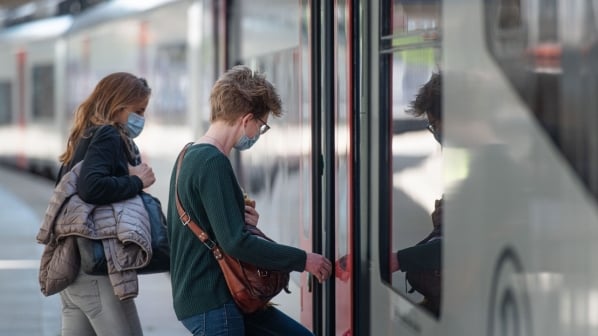The state-owned operator reports that a combination of sharply declining revenues due to low passenger numbers, and the costs of maintaining its fleet, are the primary causes of the loss.
SNCB says pre-pandemic passenger numbers were increasing at a rate consistent with the 3.5% regular annual rise reported every year since 2017, rising by 4% in January and February compared with the same period in the peak year 2019.
However, the operator experienced a sharp fall in demand following the pandemic’s outbreak, the implementation of government restrictions on travel, and the growing popularity of teleworking. In response, SNCB operated a limited timetable between March 23 and May 3 to support essential travel while minimising costs, with passenger numbers falling to around 10% of pre-Covid levels.
Following the easing of restrictions from May onwards, the number of passengers rose to a peak of 68% by early October. This was in part due to government policies to encourage rail travel, including the free Hello Belgium Rail Pass, which offers 10 free rail journeys. Almost 3.6 million Belgians have now applied for the pass.
However, passenger numbers have fallen again to around 40% of pre-crisis levels at the end of December following the reintroduction of coronavirus restrictions.
Despite the negative financial impact in 2020, SNCB says that it made a variety of improvements during the year.
SNCB hired 1300 new staff and reports that it expanded the availability of its fleet in 2020 to 85.4%, a rise of +0.7%. It has also increased its service offer to more than 400 trains per week, with plans for a further 4.7% expansion, amounting to around four million train-km, by 2023. The operator also confirmed the purchase of a new fleet of 204 double-deck M7 coaches, worth €445m, from a consortium of Alstom and Bombardier in December.
SNCB made headway on a series of improvements to stations and rolling stock during the year. 60% of its fleet is now equipped with ETCS, compared with 54.5% at the end of 2019, and SNCB plans to equip the entire fleet by 2023. Improvements at 30 stations were completed in 2020, with work starting on improvements at another 50.
Punctuality of services has also risen to 93.6% in 2020. SNCB credits the rise primarily to joint efforts by SNCB and infrastructure manager Infrabel to improve efficiency, although it acknowledges that reduced capacity due to pandemic restrictions have also been a factor. The number of occupational accidents on the network has also fallen by more than 20% compared with 2019.
“In 2020, SNCB has done everything it can to be able to transport passengers in a responsible and healthy way,” says Ms Sophie Dutordoir, CEO of SNCB. “This is a compliment to all SNCB staff who keep the whole of Belgium accessible during these special times. Our travellers can also clearly appreciate the efforts of last year and we will continue to focus on this in 2021, with an emphasis on safety, offer, punctuality, accessibility, service provision, digitisation and sustainability. In a few years’ time, SNCB expects to be back on the number of passengers in 2019, and we expect to grow by more than 15% by 2030.”

